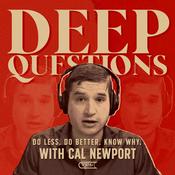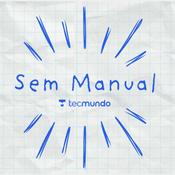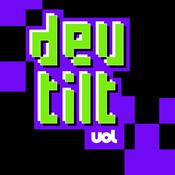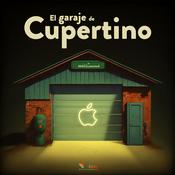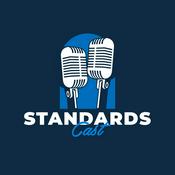414 episódios
- Writer/Director/Actor/Editor Benny Safdie is known for defying expectations and using his sense of humor to make a splash. He even once showed up on The Tonight Show with Jimmy Fallon dressed all in silver, including painted silver hair and skin. So when we sat down with Safdie over Zoom to talk about his latest movie The Smashing Machine, we weren't sure what to expect. For this interview, however, there was no face paint or sparkly clothes, he was simply wearing a shirt that said, "Radical Empathy." Turns out there's a very important reason for the shirt.
"Empathy should be cool, you know?" says Safdie. "And for this movie, I want to put you in the mind of somebody who looks invincible and you're going to feel their pain. You're going to feel what it's like to be them. You're going to be connected to them when you go in the ring. If you could be empathetic on such a deep level, where their feelings and emotions become your own, that's radical. That's a radical form of empathy. And that's what I was trying to do with the movie."
Given what Safdie says, it's no secret that all great writing starts with radical empathy.
On this episode of the podcast, we chat with him about his film The Smashing Machine starring Dwayne Johnson as UFC star Mark Kerr and Emily Blunt as his romantic partner Dawn.
Safdie talks about his personal connection to boxing and MMA, why a narrative film can tell a much deeper story than a documentary, and the highly charged fighting between Mark and Dawn that took place out of the ring, and why they ultimately couldn't make their relationship work.
To learn more, listen to the podcast. - "We try to answer two questions before we say yes to a job or embark on a spec script: Why does the protagonist need this movie? And the other is: Why tell this story other than to make money? That was our attitude going into Jurassic World. That was our attitude going into Avatar," says screenwriter Rick Jaffa about how he and his writing partner Amanda Silver approach tackling a large film franchise.
On today's podcast, we sit down with Rick Jaffa and Amanda Silver to discuss their blockbuster new film Avatar: Fire and Ash, the follow up to 2022's Avatar: The Way of Water. Husband and wife, the accomplished duo have also written and produced some of the biggest and most lucrative movies in Hollywood history, including the Planet of the Apes trilogy and Jurassic World. They generously share their techniques for worldbuilding, including doing tons of research to help keep the world grounded in science and fact, and always starting with character.
They also share their mind-bending pitch for Rise of the Planet of the Apes. "What we said was, we want to take an ape from Pinocchio to Moses," says Jaffa. Silver adds, "Pinocchio meaning, I want to be a real boy – to Moses – and leading his people to the Promised Land. And that was basically the pitch."
They also describe creating the exciting new Avatar character Varang (Oona Chaplin), of the Ash People and how she magically came to life on the page. "At first, when you don't know this character at all, and it's just a piece on a playing board to move around for your plot, you're trying to figure things out. But soon they hopefully start speaking for themselves… And then once we started writing her, we got through the first scene with her, we looked at each other and said, 'My God, the world's going to fall in love with this character!'" says Silver.
To hear more, listen to the podcast. - "I didn't think I'd be a good fit as a writer if they were going to do a PG version of the story. That's not where my strength lies, so the great thing is that the version Francis [Lawrence, the director] wanted to make was the version I wanted to write. A week later, we had a meeting with Lionsgate, we pitched the project, and they said, let's do it. So, it all happened very fast. It's really not common how smooth that process went," says screenwriter JT Mollner about sharing a clear vision with the film's director for making The Long Walk.
On today's episode, we chat with JT Mollner best known for his movie Strange Darling (2023), told in six non-linear chapters, and now The Long Walk. We talk about the challenge and thrill of adapting Stephen King considering Mollner grew up mesmerized by Stephen King's books. He even read Carrie in second grade – a transgression that landed him in the principal's office for possessing obscene material. Mollner also shares a birthday with King so it seems like it was all meant to be.
Mollner also shares that he made a decision early in the writing of the screenplay not to stray too far from Stephen King's beloved novel.
"I wanted the focus of the movie to be the emotions, and the relationships. And so Francis and I talked about it, and instead of updating it completely, we decided to keep it aesthetically, sort of in the same place where the book was written. We wanted to be very, very faithful to the DNA, however, maybe in a deviated version of reality, where our country had gone in a very different direction at some point," he says.
Mollner also talks about growing up in the family business of haunted houses and why he hasn't been interested in making a horror film – yet.
To hear more, listen to the podcast. - "I love adaptations. The beauty of adaptation, especially a classic, like Shakespeare and Chekhov or Ibsen, they're such a gift because they give you this beautiful framework, and it's almost like they're begging you to take it and make it your own," says writer/director Nia DaCosta about adapting Henrik Ibsen's 1891 play Hedda Gabler into her new film Hedda.
Set in the 1950s, the movie stars Tessa Thompson in the lead role, Imogen Poots as Thea, and reimagines the character Eilert Lovborg as a queer woman (now Eileen), played by Nina Hoss.
We chat with Nia DaCosta about her journey to becoming a filmmaker, genre hopping into horror with Candyman and the upcoming 28 Years Later: The Bone Temple. She even made the superhero movie The Marvels. We also talk about the challenges of tackling the complicated, often cruel character of Hedda in the new film.
"When I read the play [Hedda Gabler]," says DaCosta, "I'm like, this woman is hilarious! She's absolutely absurd. In the play, she's so verbose roaming around this sitting room, yelling at everyone who comes in. I wanted to replicate that, but more through action. And then there's the empathy part of it. To me, her tragedy is that she will never know herself. It's a life's work to understand and know ourselves, our emotional world. I think because she is so cruel, because she is so unhappy, because she has made these decisions that have trapped herself in this life – that to me is really sad. But I don't want people to forgive her for what she's done, or to excuse it."
DaCosta also shares her advice on adapting someone else's story. "I think you have to know why you want to do it, and what it is you want to use the work to say. To let that 'why' sort of guide your pen. That's my convoluted way of saying trust your gut."
If you've been thinking about adapting a classic play into a modern movie, you don't want to miss this podcast. - "As you do draft after draft, it becomes shorter and rendered down. And [Keanu Reeves and I] would go through scenes going, 'Can people say less? Can the action be tighter? Can the action sequence be shorter?' The action is an extension of the hero's journey and if you don't give a sh*t about the character, it doesn't matter how great your action is," says Derek Kolstad about his writing process with actor Keanu Reeves when they worked on the script that would become John Wick and spark an entire franchise.
On today's episode, we speak with screenwriter Kolstad about his masterful John Wick action movies and his new animated TV show, Tom Clancy's Splinter Cell: Deathwatch based on the popular video game.
Kolstad also shares his surprising advice for coming up with action scenes that feel fresh and inventive by going back to the silent era. "Look at Buster Keaton. Harold Lloyd, and Fatty Arbuckle, the Keystone Cops. Look at how those sequences were done, and then there's Asian cinema, you know? What I love about the things that I've been a part of is there's always this sense of humor at play. Nothing's so dark and so bleak that you're not enjoying it."
To hear more, listen to the podcast.
Mais podcasts de Tecnologia
Podcasts em tendência em Tecnologia
Sobre Write On: A Screenwriting Podcast
Designed to help you navigate the screenwriting industry, Final Draft, interviews working screenwriters, agents, managers, and producers to show you how successful executives and writers make a living writing and working with screenplays, and how you can use their knowledge to break into the industry. Subscribe today to catch every episode!
Site de podcastOuça Write On: A Screenwriting Podcast, Área de Transferência e muitos outros podcasts de todo o mundo com o aplicativo o radio.net
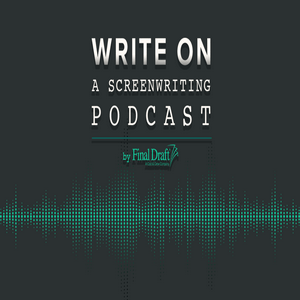
Obtenha o aplicativo gratuito radio.net
- Guardar rádios e podcasts favoritos
- Transmissão via Wi-Fi ou Bluetooth
- Carplay & Android Audo compatìvel
- E ainda mais funções
Obtenha o aplicativo gratuito radio.net
- Guardar rádios e podcasts favoritos
- Transmissão via Wi-Fi ou Bluetooth
- Carplay & Android Audo compatìvel
- E ainda mais funções


Write On: A Screenwriting Podcast
Leia o código,
baixe o aplicativo,
ouça.
baixe o aplicativo,
ouça.


















